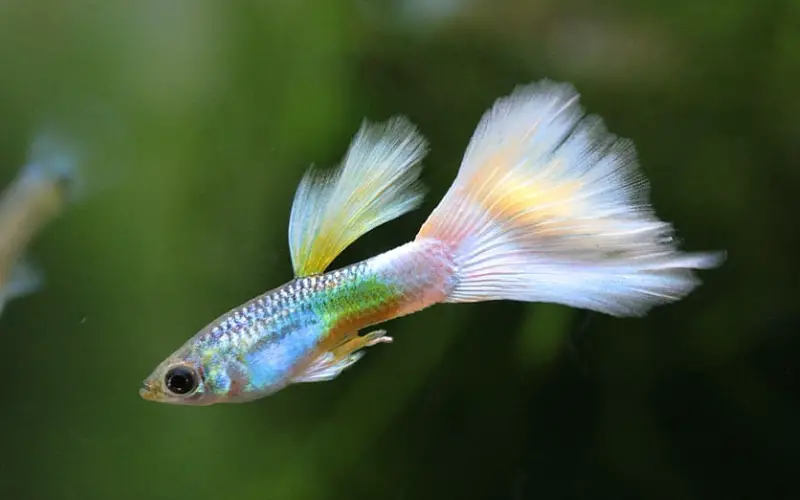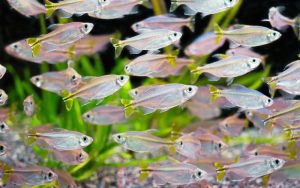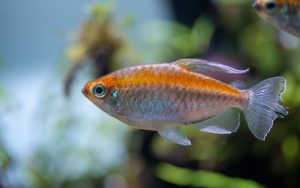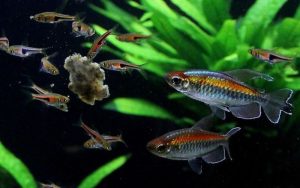Have you ever seen a tank of guppies and bettas swimming together in equilibrium? It’s quite the sight, but what does food play in this balance? Can Guppies Eat Betta Food, or is there something else they should have a snack to keep them healthy and happy?
Believe it or not, while betta fish need special dietary considerations that their smaller “cousins” don’t, finding appropriate nutrition for your aquatic buddies isn’t as complicated as it may seem.
In this article, we will explore why guppies can’t typically consume betta food and provide five alternatives to give your finned friends the necessary nutrients.
So dive into the deep end with us and learn what you should know about keeping guppies well-fed!
Table of Contents
ToggleCan Guppies Eat Betta Food?
Can guppies eat Betta fish food? The quick reply to this question is “No.” Betta food is explicitly designed for bettas and their dietary needs, which differ significantly from those of guppies.
For example, betta fish require higher protein levels than guppies and need far less plant matter in their diets. Additionally, the size and texture of many betta foods can be too large for guppies to consume, which could lead to choking.

Furthermore, the nutritional elements found in betta food are often tailored specifically for the Betta’s digestive system, which may not agree with a guppy’s tummy. So always ensure you feed your fish species-appropriate diets to keep them healthy and happy.
Is Betta Fish Food Safe for Guppies To Eat?
Is Betta Food Suitable For Guppies? Bette food can be ingested safely in guppies. Although betta foods are meat-based, guppies can develop health issues from eating more. There seems nothing odd about having a guppy who falls ill often.
The health problems arise mainly as better food is not providing guppies with the nutrition needed to thrive. Guppies also need vegetables. Not only protein.
So, your customers should vary their living food (mosquitos, larvae, worms, bugs) with the most suitable plant-based food sources.
NOTE: Female guppies are especially susceptible to nutritional deficiencies when eating betta food and may not even produce eggs. So, if you’re looking for a happy, healthy aquarium full of guppies, you’ll want to explore alternative food sources for your fishy friends.
What Food Is Best for Guppies?
Guppies are omnivores and need a balanced diet with protein and plant matter. For best results, their food should feature live or fresh wet food like shrimp and insect larvae for the protein component and high-quality flakes or granules for the vegetation.
Depending on your guppy’s needs, you may give them freeze-dried food and soft fruits/vegetables like cucumber slices or boiled zucchini. Avoid giving your guppies too much of one type of food, and try to vary their meals to ensure optimal health benefits.
5 Best Alternatives for Guppy Food:
1. Freeze-Dried Bloodworms: Bloodworms are a great source of protein, and they make an excellent snack for guppies, as long as you don’t overfeed them. Make sure to buy freeze-dried bloodworms, as live ones could introduce parasites or bacteria into your tank.
2. Flakes: Quality fish flakes are an excellent option for guppies, and you can find them in most stores that sell pet supplies. Look for flakes with high-protein content to ensure your Fish get all the nutrition they need.
3. Pellets: Quality betta pellets are another great choice, and they can be found in most pet stores. Look for ones specially formulated for guppies to ensure your finned friends get all the required nutrients.
4. Freeze-Dried Krill: Krill is a type of shrimp high in protein and other essential nutrients. It’s a great source of nutrition for guppies, and it’s easy to find in most pet stores.
5. Live or Frozen Foods: While live and frozen foods can sometimes bring parasites into your tank if you choose quality sources from reputable sellers, they make an excellent snack for guppies. Great choices include brine shrimp, daphnia, and mosquito larvae.
No matter what you decide to feed your guppies, supplement their diets with plenty of fresh vegetables such as zucchini, spinach, and lettuce. This will provide them with a natural source of vitamins and minerals that can be hard to find in processed fish foods.
Guppy Fish Ideal Dietary Requirement
Guppy fish is an omnivorous species that eat plants in their diet and is also very sensitive to consuming meat. Most of the time, your pet will eat a good-sized meal of pellets and flaked vegetables from the farm.
But, it’s best to feed the guppy fish various food options, such as fresh freeze-dried, fresh foods, or frozen foods. Providing your guppy fish with multiple foods can help improve coloration and accelerate growth. Find other foods for Guppy Fishes.
What Is Betta Fish Food?
Betta is a fish carnivore and eats insects, worms, and smaller creatures in nature. Children love meat-based food. But betta fish need many different foods to satisfy their nutritional needs.
Ready-made betta foods may be purchased in pellet, powder, or frozen form. Good quality fish pellets contain 30% to 50% proteins with no filler. Many fish owners feed bacterial larvae and worms to fish.
Factors to Remember When Feeding Guppies and Bettas?
If you feed the guppies or bettas, you must first know how the Fish is bred. Betta fish are carnivores, preferring a meat-rich diet, and the dog needs meat and vegetables. Guppies have a low tolerance to foods with high-fat content, so be careful.
Generally, betta fish are easier than guppies when they share a diet. Bettas can not eat guppy food when they are cooked in vegetables. Lastly, keep in mind that guppies are very greedy – and will eat anything that you see.
What to Consider When Keeping Guppies and Betta Fish in The Same Tank:
Many aquariums have fewer than one species. However, some precautionary measures must be complied with. Before adding another peaceful fish type to a tank with guppies, check if they’ll be similar.
Neither the guppies nor the betta fish are freshwater and require a similar environment to survive. Except for similar pH or temperature requirements, the organism will cohabit peacefully.
It is, therefore, advisable to look into the temperaments of both species for mutual understanding. Bettas Fish are usually aggressive, while guppies are quiet Fish.
To prevent disputes between them, place structures like plants or decorations in the aquarium. This will help to avoid stress and create a sense of security for both.
Giving them enough space is also essential for the safety of Fish since overcrowding can lead to territorial conflicts. With all these conditions covered
What Diet Could You Feed Both Guppies And Betta Fish?
What Is the Best Food for Betta and Guppies? You can feed guppies and betta fish a variety of food, including tropical fish flakes. These are easy to find, affordable, and nutritious for healthy growth. You can also offer frozen meaty foods like brine shrimp or bloodworms for variety.
Additionally, if you have Guppies in your tank, offering Guppy pellets as part of their diet is essential since they require more protein than Betta Fish.
How to Feed Betta Fish and Guppies in the Same Tank?
You can feed betta fish and guppies with frozen and floating food in the same tank. Betta fish prefer small live foods such as mosquito larvae, brine shrimp, earthworms, tubifex worms, and bloodworms.
Guppies do not eat these foods; they require a different type of food, such as flake or pellet food that floats on the surface.
Therefore, you should provide your bettas with live or frozen food and offer your guppies high-quality floating pellets for their nutritional needs.
Try feeding them twice daily, offering only enough food to be eaten within two minutes to ensure all the Fish have access to the food.
Can Guppy Live Depending on Only Betta Food?
No, Guppies cannot live to depend solely on betta food. While Betta Fish are carnivores and require a protein-rich diet, Guppies require a balanced diet that includes proteins and vegetable matter.
Therefore, supplement your guppy’s diet with high-quality pellets for their nutritional needs.
In short, Guppies Bettas can be kept together if their aquarium is large enough and contains structures like plants or decorations to help them feel secure. Additionally, you should provide them with a balanced betta fish diet of high-quality fish flakes, live foods, and Guppy pellets.
Can Guppies Eat Any Fish Food?
Yes, guppies can eat any fish food. They have many dietary needs and preferences that can be met with the right food. Guppies are omnivorous, meaning they eat both plant-based and meat-based foods.
They especially enjoy a mixture of sinking pellets or flakes supplemented with frozen and live food such as bloodworms, brine shrimp, and daphnia.
It’s best to feed them various foods so that no single ingredient makes up more than 20% of the diet. To ensure your puppy gets all their essential vitamins and minerals from their diet,
Is Betta Food Ok for Other Fish?
Can other Fish eat betta food? Yes, Betta food is ok to feed other Fish in your tank. However, it is specifically formulated for bettas and won’t provide the same nutrition that other species require.
It can be used as a supplement or occasional treat, but it should be different from the regular diet of your other Fish. For other species, you should always provide high-quality flakes or pellets specifically designed for their nutritional needs.
Homemade Guppy Food
When you have the time, make the Guppy meals. Typical dishes are brine shrimp, boiled egg yolks, beef heart, and daphnias. The guppies can have frozen vegetables like carrots, zucchini, broccoli, potatoes, and cabbage. Tell me the easiest way to make guppie veg.
Always clean vegetables thoroughly to avoid toxins and contaminant residue. Having puppies fed betta food means they only get fat and proteins without taking the necessary vitamins and minerals.
Commonly Asked Questions about What Can Guppies Eat (FAQ)
Can Guppies Eat Tetra Food?
Yes, guppies can eat Tetra food. Tetra makes a variety of high-quality flakes and pellets specifically designed for the nutritional needs of guppies.
Can Guppies Eat Frozen Food?
Guppies can eat frozen food such as brine shrimp, bloodworms, and daphnia. Frozen foods can be used as a supplement to their regular pellet or flake diet or as an occasional treat.
Can Guppies Eat Shrimp?
Yes, guppies can eat shrimp as an occasional treat. However, it should not replace their diet of pellets and flakes as it is too high in fat.
Can Guppies Eat Algae?
Yes, guppies can eat algae as part of their diet. Algae provides essential vitamins and minerals necessary for their health and well-being. It can offer algae as flakes, pellets, or live plants.
Can Guppies Eat Bloodworms?
Yes, guppies can eat bloodworms as an occasional treat. However, they should keep their regular diet of flakes and pellets as they are too high in fat. Bloodworms can also be frozen, which makes them an easy treat to have on hand.
Can Guppies Eat Tropical Fish Food?
Your Fish will thrive on a well-balanced diet of tropical flakes, veggies, and Guppy pellets as staples. To ensure their continued health, supplement your routine with varied frozen foods, such as brine shrimp or mosquito larvae, to fuel protein needs – or nutrient-enriched bloodworms & daphnia for added vitamins!
Can Guppies Eat Goldfish Food?
Yes, guppies can eat goldfish food. Goldfish food is usually formulated with a broad range of nutrients beneficial for all types of Fish, including guppies. However, it is best to provide a variety of foods rather than just one type to optimize your guppy’s overall health and nutrition.
Can Guppies Eat Fish?
Yes! Adult Guppies can safely eat small Fish and other small animals, such as insects, daphnia, or cyclops. Special care should be taken when feeding them these foods because they can choke if the items are too large. It is also essential to ensure that they receive a balanced diet with various foods.
Are Tropical Fish Foods Safe for Guppies?
Yes, tropical fish foods are generally safe for guppies. This type of food is typically formulated with a broad range of nutrients that provide the essential vitamins and minerals for the health of guppies.
Can Betta Fish Eat Plant-based Fish Food?
Yes, betta fish can eat plant-based fish food. This type of food contains a balance of essential vitamins and minerals necessary for betta fish’s health and well-being. Plant-based fish food also provides them with a fiber source, which helps regulate their digestive system.
Can Betta Fish Eat Guppy Fry?
Bettas are predatory animals and usually exhibit aggressive behaviors against other aquariums in general. It could try eating Guppy fry, but it could fail. Separate the guppy fry if you intend to grow them.
Do Guppies Eat Flakes?
Yes, guppies love flakes. Flakes provide a balanced diet and contain essential vitamins and minerals for their health and well-being.
Conclusion
So, can you feed guppies betta food? Guppies are a rewarding type of pet that require specialized care. Understanding what kinds of food they should eat and how much of it is essential in keeping them happy and healthy. Betta food should not be fed to guppies, as they lack the nutrients and vitamins necessary for optimal health. However, plenty of alternatives are available that can adequately meet their nutritional needs.
Examples include frozen brine shrimp, flakes, Spirulina tablets, freeze-dried daphnia, and bloodworms. By understanding each option (including their pros/cons and cost), you can ensure your guppy has a varied diet full of quality nutrition. All in all, finding the right food for your guppy is well worth the effort!
You might also like
- Are Guppies Aggressive: 3 Guppy Aggression Signs (Solved)
- How Many Guppies in a 10 Gal Tank: (An Exclusive Guide)
- How Long Do Guppies Live: 7 Easy Tips to Prolong Their Life
- Is Guppy a Schooling Fish? Let’s Clear Up All the Confusion
- How Big Can Guppies Get: A Comprehensive (Beginner’s Guide)
- How Many Guppies in a 3 Gal Tank? (Comprehensive Guide)
- Can Guppies Go with Betta Fish: 6 Easy Tips to A Peaceful Tank
- What to Feed Newborn Guppy Fry: 5 Nutritional Foods for Rapid Growth!
- How Long Can a Guppy Fish Go Without Food: (Solved & Explained)
- Can Guppies Eat Algae: Comprehensive Guide You’ll Ever Need!
- Can Guppy Fish Eat Frozen Bloodworms: The Shocking Truth! (Revealed)
- Do Guppies Eat Flakes: Top 7 Best Fish Food for Guppies!




